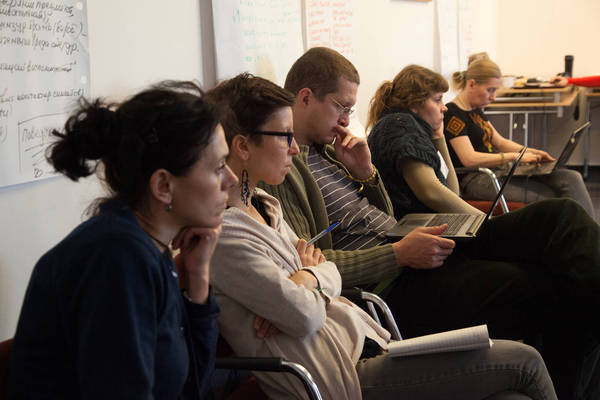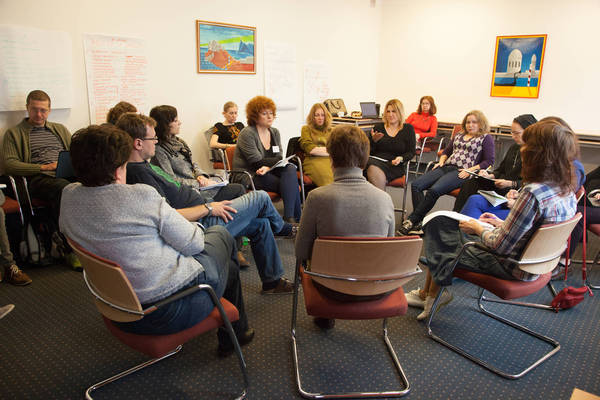Caritas Czech Republic in cooperation with Fire Rescue Service of the Czech Republic organised education training for fifteen Ukrainian psychologists. They arrived in Prague on 13th October and remained there for an entire week to improve their first psychological aid techniques.
I am standing in the corner of a room and listening to melodious voices of Ukrainians who are singing folk song about long life wishing. Human unfamiliar with contexts would have barely identified reason of their visit... Fifteen Ukrainian psychologists came to Czechia to study first psychological aid, crisis intervention and trauma work. For example, on themes which are very real in context with political matters in Ukraine. Everybody who is exposed to human pain – doctors, psychologists, social workers, volunteers and priests are realising the importance of knowledge in knowing what to do in hard situations. They work with wounded, deflated and bereaved people and witnesses of war.
Meeting with colleagues from Ukraine was rewarding for four members of the instructor team assembled from Czech Fire Rescue Service psychologists. “Fortunately, we don’t have experience with traumas caused by war conflicts in our conditions. It was very beneficially to hear what our Ukrainian colleagues face up to“, says Zuzana Dittrichova, director of Fire Rescue Service of the Czech Republic psychology department. When inquiring Ukrainians asked which intervention was most difficult during her work experience, she answers without pause: all where children’s lives were at stake. Her colleague Sona Pancochova from region Zlin stated the same answer. She is involved in civil association, providing support for parents who have lost a child.
When the world will fall to small pieces
 I am drawing a link which represents my life on paper. I will mark important moments of my life, pleasant and less pleasant too. When I look to the future, somebody tears my sheet of paper in half. Meanwhile a group is still numbly sitting and wondering on the floor, I am fantasising that going to happen to my life.
I am drawing a link which represents my life on paper. I will mark important moments of my life, pleasant and less pleasant too. When I look to the future, somebody tears my sheet of paper in half. Meanwhile a group is still numbly sitting and wondering on the floor, I am fantasising that going to happen to my life.
Instructor Eva Biedermannová, Czech Fire Rescue Service psychologists, compares passed moments to conditions when circumstances at what do not works method used up to now appears in human life. Cogitation is like a fog without hope that the fog will lift. We feel anger, worry, wrath, aggression, guilt and according to this we behave towards our surroundings, alternatively maybe not. Sometimes people feel nothing, just emptiness.
The crisis intervention method works with people during the initial moments after an accident. The goal is to stabilize the person so he can feel his feet on the ground, also understand what happened and know his firsts steps to recovering. The method deals with things that happen right now and right there. Deep background and far future are psychotherapy interests.
“We endeavour to empower the client as much as we can, if it is slightly possible because he is expert on his life. We offer him options which he may not consider. We ask what has already been tried and if it worked as he planned. We try to involve his family, friends and neighbours in aid. Process is different when client is panic. Human security, which can be factually damaged without afflicted client’s perception, is our definite priority in this case. In such cases we advise straight to client what steps he did“, adds instructor.
Badly: “Do not cry longer“!
I am hiding under the table and crawling to Olena. She is hunkered down with closed eyes and her body is shaking. We have forbidden all verbal contact. I stir on the floor several times over to get comfortable. After a while I am daring to slightly put my hand on her forearm which is one of the safest parts of human body. She moved a bit while she is still shaking but does not drag her hand away. I took a breath after managing the first step. I am thinking about my height compared to her, I should be her height or a little bit lower. If I bend over her, she would be frightened. Approximately after five minutes I managed to lay my hands on her upper back. Our bodies calm and we breathe deeply at the same tempo. Olena is opening her eyes slowly.
Human contact in panic is one of the initial steps that crisis interventionist have to manage.
As instrument helping to stabilize the body and psyche, connecting body to the earth works well but not universally. We always need to think that human who we help, we see for the first time in our life. We do not know him and his experiences. Working with the human body means to enter into his intimate zone. This is not comfortable for everybody. That is why we prefer to describe offered actions to the human beforehand.
Always is accepted: offer but do not press if human is not life-threatening. Respect client’s needs and give him time. According to psychologists Eva Biedermannová we should not simplify a situation and do not use vain soother in any case. Using phrases like “do not cry any longer“ or “that is nothing, it is not worth a cry“ does lead to nowhere and does not help. Emotions have place in our life. We ask for complicated trouble called trauma if we do not let them go away.
Trauma – frozen energy
 When Tania was called, she wasn’t asking for details because there wasn’t enough time. She got into the car with her colleague and drove to the military area. In a few sentences she gathered from the doctor about enormities which happened in the locality a few days ago. It was necessary to free torn bodies of deceased people from entrapment and bury them with respect.
When Tania was called, she wasn’t asking for details because there wasn’t enough time. She got into the car with her colleague and drove to the military area. In a few sentences she gathered from the doctor about enormities which happened in the locality a few days ago. It was necessary to free torn bodies of deceased people from entrapment and bury them with respect.
After a period of quietness a thirty years old soldier got undressed in order to not raise suspicion that he is armed and went to collect and drag away separated body parts to safety. Some of parts were deformed so much so that it wasn’t possible to identify the deceased person. The doctor who had to take photos of the corpses became physically sick of this scene.
After that occurrence a stout soldier starts to behave strangely. His superiors are disconcerted by aggression and minimal verbal contact.
Tania finished a story “I want to stop with narration of this story on the places where wasn´t a mood for it. I must convey it to somebody – friends, colleagues, journalists all the time... I scare other people with it. I don’t want to do it“ blurted out Ukrainian psychologist.
Other colleagues and lector, who were quiet together until this moment, are asking for details and trying to imagine themselves in Tania’s position.
Pillow and doorpost
“Aggressiveness is natural in prior to situations arising, it is a defence mechanism. If we have to work with it, we must uncover what is behind it“, says psychologist David Dohnal of Fire Rescue Service of Olomouc Region who specialises in matters of trauma and work with body. On request of participants he included in a programme work with factual occurrence and its analysis.
Trauma is not flu that goes after a week. There is a need of understanding it like energy which is frozen in the body due to consequential occurrences. Energy starts to activate in the body during moments that remember traumatizing situations. Shivering, sweating, fast heart rate and pressure on the chest are typical of accompanying physiological phenomes. In exceptional cases, urine can occur.
De-traumatizing process is not work for a few hours. The process is prolonging and encumbering also because of other traumas. Generally following the initial 38 hours after traumatizing occurrences we should relax, take a break and do things which we want, not the things we must do. Often we just should cry and sleep a lot. People have tendency to begin to keep going as soon after trauma which is not right method according to Dohnal. Humans needs time in order to put into movement its equalizing mechanisms. Emotions are letting loose which is exhausting. So it is not possible to expect that we will start to perform ordinary efforts right after trauma.
We are beginning with “cognitive sewing“ as lately as a third and fourth day. We are returning back in time which was far before an experienced trauma and we want to know what happened after. The moment that happened right before a trauma we open up at the time when client is stabilized. Emotional body manifestations which are necessary to burn energy uncovers as we go through traumatizing occurrence again. “Aggression is one of the typical manifestations. It is suitable to have on hand a pillow which after common agreement the client can hit a few times during re-experiencing a trauma. Well-established method is also the doorpost. We set a client in the doorpost and let him hand push strong to the counter sides,“ David Dohnal sum up.
Helping bereaved people in Ukraine is not easy for psychologists. They often fall to decline. They work as public servants and in the eyes of a many people they have complicity in things which happens in the country.
Psychologists Tania is calmer after an hour and a half. She is clear about the immediate steps that she will do: she will resume occurrence during the supervision (improving the quality of work in helping professions) again and she will clearly define subjects and how to work on them in case of long-term work with community in military area.
Participants finished education training in their own manner – with the exchange of presents imported from a couple regions in Ukraine for lectors and organizers. Then they sang a folk song and expressed thanks in words: “we feel Czech support, do not stop, please“.
Caritas Czech Republic is working now on translations of materiel shared by lectors during the education training.
In the case of successful finding of coffers, Ukrainian psychologists will come next year again, but this time accompanied also by their own firemen who will have a chance to see first psychological aid shown by skilled Czech firemen.







